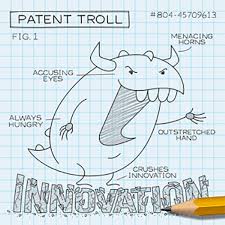Patent trolls are starting to get trampled

Patent trolls, which has helped to keep the United States in the economic doldrums, are finally being brought to heel by anti-patent groups and court cases.

First, the Open Invention Network (OIN), whose members include Google, IBM, NEC, Philips, Red Hat, and Sony, now has more than a thousand licensees in its Linux and open-source, defensive patent pool. In an e-mail , Keith Bergelt, OIN's CEO said, "The OIN license is becoming part of a broader set of community norms and is increasingly being integrated into the culture of open source/Linux-centric companies. It is for many the foundation around which their IP [intellectual property] strategy is built and a critical enabler of patent non-aggression and freedom to operate."
Under the OIN license, community members cross-license Linux patents to one another on a royalty-free basis. OIN-owned patents are similarly licensed royalty-free to any organization that agrees not to assert its patents against Linux.
While the OIN licensee community becoming the largest patent non-aggression community in the history of technology helps Linux, it doesn't help those outside the open-source world. Fortunately, the Supreme Court has finally started ruling against bad patents.
In Nautilus v. Biosig, the Court ruled that for a patent to be valid, an expert in in the field had to be able to understand it with "reasonable certainty." In Limelight v. Akamai, the Court ruled that a patent that covered a series of steps was not infringed if more than one person or business carried out the various steps. And, last but most important of all, in Alice v. CLS Bank, the Court ruled that an abstract idea is not patentable just because it's now being done on a computer.
Since then, nine patent cases, according to Lex Machina which tracks patent lawsuits, have gone to defeat. Most of these were nailed by the change in standards caused by Alice v. CLS Bank. This has resulted in what the Wall Street Journal called, " a worst-case scenario for … 'patent trolls.'"
Featured
So much for paying patent trolls for computer bingo games or the idea of using a computer to convert one vendor's reward points to another's!
In two much smaller patent cases that made it to the Supreme Court, Octane Fitness v. Icon Health and Fitness and Highmark v. Allcare, the Court ruled that prevailing parties can now much more easily recover their attorney fees in patent cases. Because defending against a bad patent can cost millions and a patent troll will often settle for tens of thousands, being able to recover your legal fees will encourage defendants to fight to the end and for trolls to be more wary of suing companies that show they won't put up with abuse.
Rackspace, the cloud company, which just knocked out Rotatable Technologies' rotating screen patent, pointed out that not only will Rackspace "not pay one penny to this troll, nor will Apple, Netflix, Electronic Arts, Target, Whole Foods or any of the other companies sued by Rotatable for how they use screen rotation technology in their apps." And, the company also observed that because it's now "much easier for those of us who are sued by a troll to recoup our fees from these extortion attempts," this validates the "business decision to pursue every case to the hilt."
None of this has amounted to the sweeping victory against IP patents many of us have hoped for, but it appears that patent trolls are finally in real trouble. Between defensive patent alliance, such as OIN, and victories in the courts, the end of patent trolls may finally be in sight. It can't come fast enough for many of us!
Related Stories:
- Bad Microsoft Android patents may lie behind Samsung lawsuit
- Apple and Samsung drop all patent lawsuits outside the US
- Apple and Samsung find themselves on the same side in patent fight
- Pro-patent Partnership for American Innovation lobby wobbles on take-off
- 56 percent of all patent lawsuits are made by patent trolls